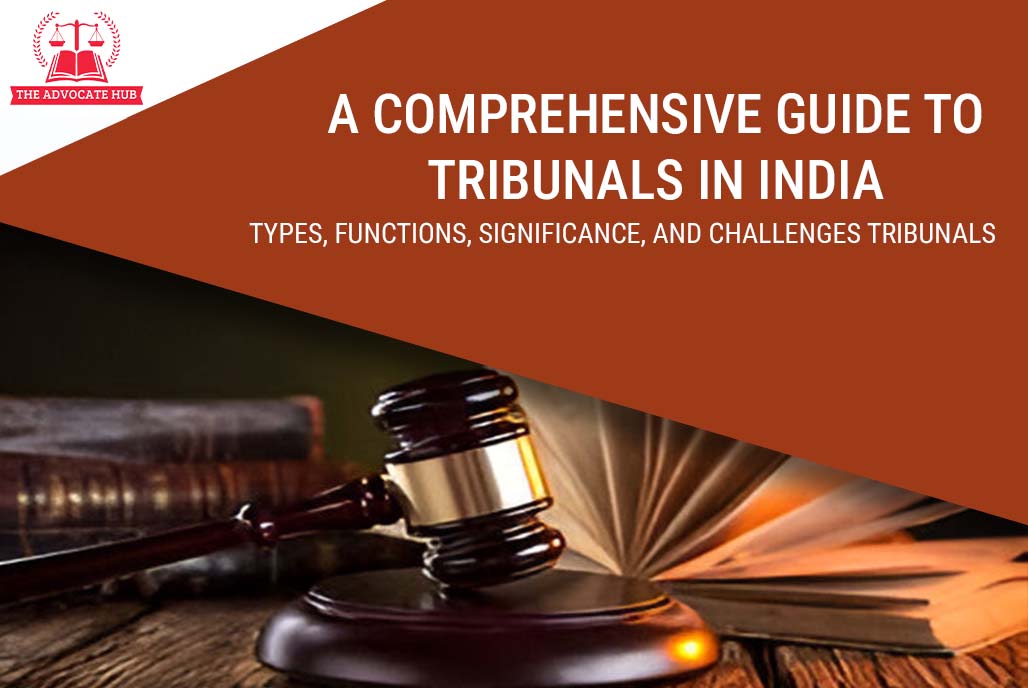Tribunals in India constitute a vital component of the country’s legal and administrative framework, offering specialized forums for adjudicating disputes and administrative matters outside the traditional court system. This comprehensive guide explores the diverse types of tribunals in India, delving into their historical background, legislative framework, functions, significance, challenges, and prospects.
Historical Background and Evolution of Tribunals in India
The establishment of tribunals was meant to create specialized adjudicating bodies that deal with certain types of disputes and administrative problems in India. The idea behind creating such bodies came about during an era when there were efforts aimed at streamlining judicial processes through administrative reforms which would allow quick resolution for conflicts between parties involved. Legislative measures aimed at decentralizing administrative adjudication in specific areas of law can be traced back to when they were introduced into the country.
Legislative Framework and Types of Tribunals in India
- Central Administrative Tribunal (CAT):
- Jurisdiction: CAT adjudicates disputes related to recruitment, service conditions, and administrative matters concerning central government employees.
- Function: CAT operates under the Administrative Tribunals Act, 1985, providing an exclusive forum for resolving disputes swiftly and uniformly across central government departments.
- Significance: By ensuring consistency in administrative decisions, CAT promotes efficiency and fairness in the management of central government services.
- Importance: CAT’s role in expediting administrative justice reduces litigation in higher courts, thereby enhancing overall governmental effectiveness.
- State Administrative Tribunals (SATs):
- Jurisdiction: SATs handle similar disputes as CAT but at the state level, focusing on administrative matters concerning state government employees.
- Function: Established under state-specific laws, SATs decentralize administrative adjudication, offering localized solutions to employment disputes within respective state jurisdictions.
- Significance: SATs alleviate the workload of state high courts, ensuring effective governance and localized resolution of administrative issues.
- Importance: By promoting administrative autonomy and efficiency, SATs contribute to fair and equitable resolution of state employment disputes.
- Income Tax Appellate Tribunal (ITAT):
- Jurisdiction: ITAT hears appeals filed against orders issued by the Income Tax Department concerning income tax assessments under the Income Tax Act 1961.
- Function: ITAT acts like an independent quasi-judicial body providing a platform where taxpayers together with tax authorities can settle contentious matters related to taxation through expert advice.
- Significance: To foster confidence within the tax administration system ITAT ensures uniformity among decisions made on taxes while promoting rights for taxpayers thus minimizing litigation cases arising from this sector.
- Importance: By clarifying taxation laws or expediting dispute resolution processes revenue stability is supported leading to economic growth according to its importance level.
- National Green Tribunal (NGT):
- Jurisdiction: Cases dealing with environmental protection should be heard by NGT all over India regardless of geographical location since it’s mandated by law.
- Function: Under the National Green Tribunal Act of 2010, NGT serves as a dedicated arena for ruling on eco-related disagreements and punishing offenders who do not comply with environmental regulations.
- Significance: As one of India’s most important institutions ensuring sustainable development through strict regulatory frameworks, NGT has played a key role in protecting the environment.
- Importance: Public health is safeguarded and ecological balance is maintained when NGT enforces accountability towards conservation efforts around nature.
- Debts Recovery Tribunal (DRT):
- Jurisdiction: The common cases decided by it relate to the recovery of loans due to banks and financial institutions under the SARFAESI Act, 2002.
- Function: DRT accelerates the debt recovery processes and provides the creditors with an effective legal way to recover NPAs.
- Significance: DRT is positively related to our analysis because it helps in clearing the banking sector’s NPAs and is against credit indiscipline.
- Importance: As the mechanism of early debt collection, DRT contributes to improving the availability of funds in the financial sector and promoting economic activity.
- Intellectual Property Appellate Board (IPAB):
- Jurisdiction: Appeals in IP matters are under section 29 of the IP Code and IPAB hears appeals against the Registrar’s decisions on such laws as patents, trademarks, and copyrights.
- Function: IPAB is responsible for the harmonization of usage as well as the promotion of Intellectual Property rights for innovative businesses.
- Significance: By using professional approaches, IPAB fosters innovation and development in technology due to the complexities of litigation issues.
- Importance: In the process of protecting IP rights, IPAB furbishes competitiveness of trading Indian products in international markets besides encouraging investments in research and development activities.
- National Company Law Tribunal (NCLT):
- Jurisdiction: It deals exclusively under the Companies Act 2013 Insolvency Bankruptcy Code 2016 companies insolvency mergers corporate governance matters.
- Function: NCLT facilitates corporate restructuring, protects stakeholders’ interests, and ensures transparency in corporate transactions.
- Significance: NCLT facilitates corporate restructuring transparency among stakeholder’s interests should be ensured during business transactions facilitated thereby protecting vulnerable parties involved.
- Importance: Corporate dispute resolution streamlined business ease supported investor confidence enhanced contributions to robust environments conducive to sustainable economic growth.
- State Consumer Disputes Redressal Commission:
- Jurisdiction: The State Consumer Commissions work under the Consumer Protection Act, 2019 to solve consumer disputes with a monetary value above a certain limit at the state level.
- Function: Fast resolution of complaints is offered by these commissions which provides easier access for consumers to rectify defective goods or inadequate services they have paid for.
- Significance: Effective dispute-resolving agencies that protect consumer rights and promote welfare among them are known as State Consumer Commissions such as those found in India.
- Importance: These commissions support laws on protecting consumers thus increasing their trust and encouraging fair trade practices within the marketplace.
- District Consumer Disputes Redressal Forum:
- Jurisdiction: District Forums deal with lower-priced complaints from consumers at the district level according to the Consumer Protection Act, 2019.
- Function: District Forums aim to ensure the quick settlement of cases involving unsatisfactory products or services by providing local solutions for consumer conflicts.
- Significance: These forums act like the first layer that defends against everyday grievances raised by shoppers about different goods or services used.
- Importance: By promoting consumer awareness and enforcing consumer rights, District Forums contribute to marketplace accountability and consumer empowerment.
- Securities Appellate Tribunal (SAT):
- Jurisdiction: Appeals against orders by the Securities and Exchange Board of India (SEBI) on securities market and investors protection are heard by SAT.
- Function: SAT facilitates efficiency in the operation of capital markets by conducting hearings and reviewing grievances, complaints, and regulatory actions relating to securities business.
- Significance: SAT is involved in several responsibilities; protecting investors’ interests, ensuring professionalism, integrity, and compliance of the securities market.
- Importance: For this reason, SAT helps to strengthen investors’ confidence by offering an effective appellate process for at least securities-related controversies and assists in capital formation which is crucial in economic growth.
Functions and Importance of Tribunals
Tribunals fulfill several critical functions within India’s legal framework:
- Specialization: Each tribunal focuses on one area of law to be efficient when solving related problems within its jurisdiction.
- Speedy Justice: Compared to normal courts, tribunals dispose of cases more quickly thereby lessening congestion in litigation due to delayed settlements.
- Relief To Courts: Ordinary courts can direct attention toward intricate legal matters requiring appellate consideration since tribunals will have catered for specialized issues.
- Expert Adjudication: Tribunal members often include specialists in law and related fields, ensuring informed decision-making and effective resolution of intricate legal disputes.
- Accessible Remedies: Tribunals provide accessible forums for dispute resolution, offering litigants a cost-effective and efficient alternative to traditional court proceedings.
Challenges and Reforms
- Operational Challenges: Tribunals face challenges such as delays, vacancies in tribunal benches, and procedural complexities, impacting their efficiency and effectiveness.
- Reform Initiatives: Ongoing reforms aim to address these challenges, enhancing tribunal autonomy, improving infrastructure, and adopting technology-driven solutions to streamline processes.
Public Awareness and Consumer Rights Protection
- Consumer Protection: Bodies such as state commissioners board members and district forums play a key role in safeguarding buyer interests while ensuring fairness prevails during transactions conducted within India’s business environment.
- Awareness campaigns: Designed strategically aimed at enlightening citizens about this judiciary system will therefore open up access channels leading towards justice provision thereby empowering individuals who feel wronged into taking corrective action against those responsible for causing them harm.
Future Prospects and Impact of Technological Advancements
- Digital Initiatives: Integration of technology in tribunal proceedings, such as e-filing, virtual hearings, and online case management systems, enhances procedural efficiency and accessibility to justice.
- Global Best Practices: Drawing insights from international tribunal systems and best practices can further strengthen India’s tribunal framework, ensuring it remains responsive to evolving legal and governance challenges.
Conclusion
In conclusion, there are critical functions that tribunals serve in the structure of access to justice, searching for a professional approach to compile the issue and providing the opportunity for instances of fast and sufficient conflict decisions in different spheres of Indian society. As the tribunals concentrate on the vital areas of law and take support of the specialized expertise they also play a meaningful part in the enhancement of the efficacy of the legal system of India while exercising behavior that is fair as well as ethical in the administration of Justice.
It is important for different stakeholders that aim at getting the right legal redress and operating within the legal framework to comprehend the types, functions, importance, problems, and reforms of tribunals. Employing specialized adjudication and encouraging timely deliverance of justice the tribunals remain the abode of justice, fairness, and accountability in the growing legal system of India.
This all-encompassing outline stresses tribunals as being the foundation of administrative justice as they guarantee fair systems that can solve issues and protect the individual rights of citizens currently living in a pluralistic society.
For more insights on legal developments and their implications, visit our website at The Advocate Hub.
Related Blog:-
Navigating Consumer Forums: District, State, and National Levels
The Legal Landscape of Live-In Relationships: Changes and Challenges with New Criminal Laws
Disclaimer
The advocatehub.com is not responsible for the accuracy of the content.

